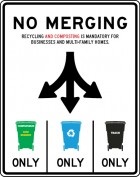
A new California State law, Senate Bill (SB) 1383, aims to keep food and other compostable materials (“organics”) out of landfills to reduce emissions that contribute to climate change.
As of January 1, 2022, SB 1383 requires all business, multifamily properties, and residents to subscribe to recycling and food waste collection services. SB 1383 also requires certain food generating businesses to redirect surplus edible food to feed people who are food insecure.
On November 16, 2021, the City of Alameda adopted a local Ordinance (No. 3310) to implement SB 1383 that requires:
-
All businesses, multi-family properties, and residents to subscribe to recycling and food waste collection services. Additionally, businesses and multi-family properties are required to:
-
Place color-coded and labeled recycling and compost bins next to all garbage bins (except in restrooms).
-
Sort materials into the proper bins—recycling, compost, and landfill.
-
Educate employees, contractors, and tenants about the law at least annually and check bins periodically to ensure proper sorting.
-
For more information and compliance assistance, please visit: https://www.stopwaste.org/rules
-
Certain food generating businesses* to recover surplus edible food by partnering with a food recovery organization and tracking and maintaining records.
*Tier 1 sites that must start surplus food donation by 1/1/22: large supermarkets ($2M+ gross annual sales), grocery stores (>10,000 sq. ft.), food service providers, food distributors, and wholesale food vendors. Tier 2 sites that must start surplus food donation by 1/1/24: large health facilities (100+ beds), hotels (200+ rooms), large venues and special events (2,000+ individuals per day), restaurants (>5,000 sq. ft. or 250+ seats), state agency facilities, and public schools.
Español (Spanish)
中文 (Chinese)
한국인 (Korean)
Tiếng Việt (Vietnamese)